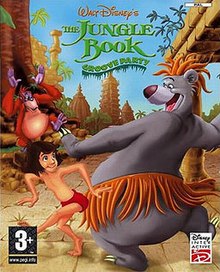Dance Dance Revolution (DDR) is a music video game series produced by Konami. Introduced in Japan in 1998 as part of the Bemani series, and released in North America and Europe in 1999, Dance Dance Revolution is the pioneering series of the rhythm and dance genre in video games. Players stand on a "dance platform" or stage and hit colored arrows laid out in a cross with their feet to musical and visual cues. Players are judged by how well they time their dance to the patterns presented to them and are allowed to choose more music to play to if they receive a passing score.

Bust A Move: Dance & Rhythm Action/Bust A Groove is a rhythm game for the Sony PlayStation released in 1998. The game was developed by Metro and published by Japanese multimedia publisher Enix in Japan, published in North America by now-defunct 989 Studios and published in Europe by Sony Computer Entertainment Europe.

King Louie is a fictional character introduced in Walt Disney's animated musical film The Jungle Book. He is an orangutan who leads other jungle primates and wants to become more human-like by gaining knowledge of fire from Mowgli. King Louie is an original character not featured in Rudyard Kipling's original works.
Dancing Stage is a series of music video games developed and published by Konami. It is a spin-off of Dance Dance Revolution for the European market as well as a few Japanese titles. Games were released for arcade, PlayStation, PlayStation 2 and Wii.

Baloo is a main fictional character featured in Rudyard Kipling's The Jungle Book from 1894 and The Second Jungle Book from 1895. Baloo, a sloth bear, is the strict teacher of the cubs of the Seeonee wolf pack. His most challenging pupil is the "man-cub" Mowgli. Baloo and Bagheera, a panther, save Mowgli from Shere Khan the tiger, and endeavor to teach Mowgli the Law of the Jungle in many of The Jungle Book stories.

The Jungle Book is a 1967 American animated musical comedy film produced by Walt Disney Productions and released by Buena Vista Distribution. Based very loosely on Rudyard Kipling's 1894 book of the same title, it is the final animated feature film to be produced by Walt Disney, who died during its production. It was directed by Wolfgang Reitherman and written by Larry Clemmons, Ralph Wright, Ken Anderson, and Vance Gerry. Featuring the voices of Phil Harris, Sebastian Cabot, Louis Prima, George Sanders, Sterling Holloway, J. Pat O'Malley, and Bruce Reitherman, the film's plot follows Mowgli, a feral child raised in the Indian jungle by wolves, as his friends, Bagheera the panther and Baloo the bear, try to convince him to leave the jungle before the ruthless tiger Shere Khan arrives.

David Lubega Balemezi, better known by his stage name Lou Bega, is a German singer. His 1999 song "Mambo No. 5", a remake of Pérez Prado's 1949 instrumental piece, reached no. 1 in many European countries and was nominated for a Grammy Award. Bega added his own words to the song and sampled the original version extensively. Bega's musical signature sounds consist of combining musical elements of the 1940s and 1950s with modern beats and grooves.

The Jungle Book 2 is a 2003 animated adventure film produced by the Australian office at DisneyToon Studios and released by Walt Disney Pictures and Buena Vista Distribution. The theatrical version of the film was released in France on February 5, 2003, and released in the United States on February 14. The film is a sequel to Walt Disney's 1967 film The Jungle Book, and stars Haley Joel Osment as the voice of Mowgli and John Goodman as the voice of Baloo.
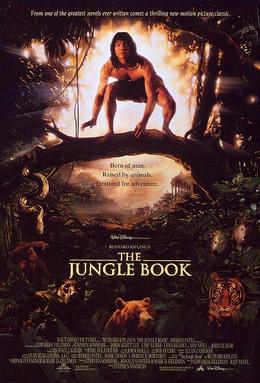
Rudyard Kipling's The Jungle Book, also known as The Jungle Book, is a 1994 American adventure film co-written and directed by Stephen Sommers, produced by Edward S. Feldman and Raju Patel, from a story by Ronald Yanover and Mark Geldman. It is a live-action adaptation of the Mowgli stories from The Jungle Book (1894) and The Second Jungle Book (1895) by Rudyard Kipling, alongside Walt Disney's animated feature film of the same name from 1967; unlike its counterparts, the animal characters in this film do not talk.

Dancing Stage is a music video game, developed by Konami, released in European arcades on March 9, 1999. In North America, the game was released as Dance Dance Revolution on the same date, and it received a PlayStation port on March 6, 2001. It is the first international release of the game. The arcade version features 13 songs, with 11 of these available on the PlayStation port, while Dancing Stage Internet Ranking adds another three exclusive songs to arcades.

Disney's The Jungle Book is a series of platform video games based on the 1967 Disney animated film of the same name. The game was released by Virgin Interactive Entertainment in 1994 for the Game Boy, Nintendo Entertainment System, Master System, Genesis/Mega Drive, Game Gear, Super Nintendo Entertainment System, and MS-DOS. While gameplay is the same on all versions, technological differences between the systems forced changes – in some case drastic – in level design, resulting in six fairly different versions of the 'same' game. This article is largely based upon the Genesis version.
"The Bare Necessities" is a jazz song, written by Terry Gilkyson, from Disney's 1967 animated feature film The Jungle Book, sung by Phil Harris as Baloo and Bruce Reitherman as Mowgli.
"I Wan'na Be Like You (The Monkey Song)" is a song from Walt Disney's 1967 film The Jungle Book. The song was written by songwriters Robert and Richard Sherman, and was performed by singer and musician Louis Prima as King Louie, with Phil Harris providing additional vocals as Baloo the bear.
"Trust in Me (The Python's Song)" is a song in the popular Walt Disney film The Jungle Book, from 1967. The song was sung by Sterling Holloway playing the part of Kaa, the snake. The song was written by Disney staff songwriters Robert and Richard Sherman. In the song, Kaa hypnotizes Mowgli into a trance, sending Mowgli sleepwalking along his body until he finally coils himself around Mowgli just like he did before. As the song concludes, Kaa readies himself to devour the boy, only to be stopped by Shere Khan the tiger in his search for Mowgli.
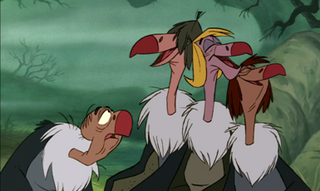
"That's What Friends Are For (The Vulture Song)" is a song in the Walt Disney film The Jungle Book from 1967. It was sung by a quartet of "mop top" vultures who are making friends with Mowgli, the main character of the film. The song was written by Disney staff songwriters, Robert and Richard Sherman, and sung primarily by J. Pat O'Malley, Lord Tim Hudson, Digby Wolfe, and Chad Stuart. Bruce Reitherman and George Sanders both made cameo appearances in the song singing as Mowgli and Shere Khan the tiger, respectively, in different parts. In the soundtrack album, The Mellomen member Bill Lee replaced the unavailable Sanders.
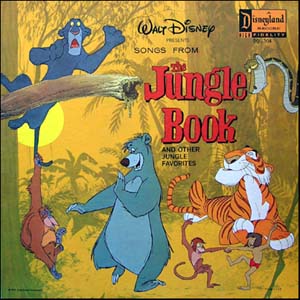
The Jungle Book, the soundtrack to the eponymous Disney film, has been released in three different versions since the film's original release in 1967. The film score was composed by George Bruns, with songs written by Terry Gilkyson and the Sherman Brothers.
The Jungle Book is a Disney media franchise that commenced in 1967 with the theatrical release of The Jungle Book. It is based on Rudyard Kipling's works of the same name. The franchise includes a 2003 sequel to the animated film and three live-action films produced by Walt Disney Pictures.
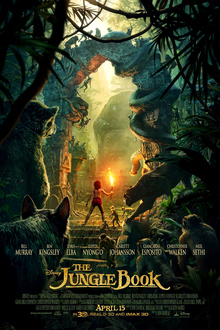
The Jungle Book is a 2016 American adventure drama film directed and produced by Jon Favreau, written by Justin Marks and produced by Walt Disney Pictures. Based on Rudyard Kipling's eponymous collective works, this film is a live-action remake of Walt Disney's 1967 animated feature film of the same name. Neel Sethi plays Mowgli, the orphaned human boy who, guided by his animal guardians, sets out on the journey of self-discovery while evading the threatening Shere Khan. This film includes voice and motion capture performances from Bill Murray, Ben Kingsley, Idris Elba, Lupita Nyong'o, Scarlett Johansson, Giancarlo Esposito, and Christopher Walken.

Disney Stars on Parade is the current parade in Disneyland Park at Disneyland Paris. The parade premiered on 26 March 2017, as part of the park's 25th anniversary celebration. The parade celebrates the discovery of the lands of imagination, represented by various Disney and Pixar films, such as Toy Story, The Jungle Book, The Lion King, Finding Nemo, SleepingBeauty, and Frozen.

The Jungle Book (Original Motion Picture Soundtrack) is the soundtrack album to the 2016 eponymous Disney film, which is a live-action/CGI adaptation of the 1967 animated film of the same name. Directed by Jon Favreau, the film features musical score composed and conducted by his frequent collaborator John Debney, mostly drawing from George Bruns' original music. Few of the tracks were incorporated from the 1967 film's soundtrack written by Sherman Brothers and Terry Gilkyson. The score was recorded at Los Angeles, California and New Orleans, with prominent players and large orchestral members recording the score. Walt Disney Records released the film's soundtrack on April 15, 2016. It received positive reviews for the musical score, as well as incorporated songs from the 1967 film, being well received. John Debney missed the nomination for Academy Award for Best Original Score, though at the Hollywood Music in Media Awards, he won Best Original Score – Sci-Fi/Fantasy Film as well as receiving a Satellite Award for Best Original Score nomination.
